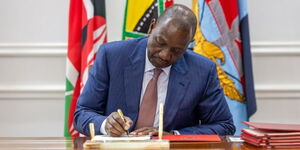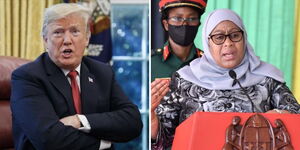Experts have raised concerns that the new move by the Government of Kenya to increase taxes on goods imported from neighboring East African countries would spark outrage from the states.
The Finance Bill 2021 signed into law by President Uhuru Kenyatta on Tuesday imposes a tariff of up to 25 percent on imported goods including eggs, potato chips and crisps, and onions beginning July 1, 2021.
The imported furniture will also attract an excise duty of 25 percent.
Even though the move seems to protect local producers from stiff competition in the regional market, experts warn it could hurt business relations among the countries and would increase taxes on exports from Kenya.
According to the Trading Economics report, Kenya exported soaps, lubricants, waxes, candles, modelling pastes worth Ksh5.2 Billion to Tanzania.
It also exported animal, vegetable fats and oils, cleavage products worth Ksh11.7 Billion to Uganda the same year. This could be affected by the new taxes were the other East African countries to respond in kind.
The experts also warn Kenya would experience a great shortage of goods it imports from the neighbors. Kenya imports most of its eggs and chicken products from Uganda and onions from Tanzania alongside other consumables.
The Trading Economics report shows Kenya imported cereals worth Ksh6.5 Billion from Tanzania in the year 2020. The same year, Kenya imported dairy products, eggs, honey, edible products worth Ksh6 Billion from Uganda.
The two countries' response to the Kenyan move may adversely affect the flow of the goods and manufacturers will be caught in the middle.
Naomi Majale, a project officer with the National Taxpayers Association supported the move to increase taxes saying it was in line with the conditions imposed on Kenya by the International Monetary Fund (IMF) and was necessary for the country’s fiscal consolidation exercise.
“There is a need for domestic resource mobilization. Even the IMF has called for increased taxes, it’s one of the propositions they gave,” she said.











